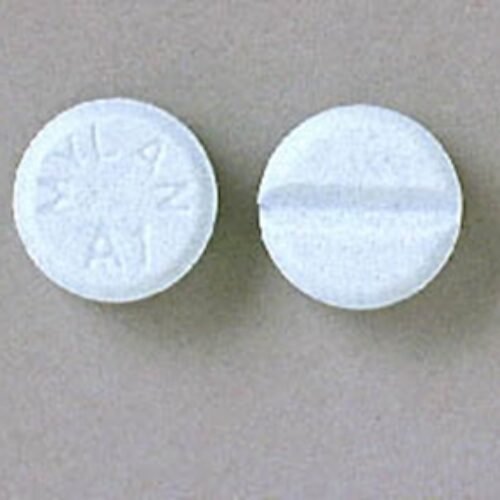Diazepam 10mg
$283.00 – $649.00
Compare+1 (862) 505-1407 Start Live Chat
Description
What is Diazepam? | Buy Diazepam Online
Diazepam is a medication classified as a benzodiazepine, a category of drugs that are commonly utilized for their sedative and anxiolytic properties. Originally developed in the late 1950s, diazepam made its debut in the market in 1963, marketed under the brand name Valium. Since its approval by health authorities, diazepam has remained a crucial player in psychiatric and medical treatments due to its effectiveness in alleviating anxiety, muscle spasms, and seizures.
The mechanism of action of diazepam involves its interaction with gamma-aminobutyric acid (GABA) receptors in the brain. GABA is a neurotransmitter that functions to inhibit neural activity, promoting a calming effect on the nervous system. By enhancing GABA’s effects, diazepam helps to reduce feelings of anxiety and tension, making it particularly beneficial in treating conditions such as generalized anxiety disorder and panic disorder. Furthermore, it can be prescribed for certain muscle-related conditions and as a premedication for medical procedures, reflecting its versatile role in healthcare.
Diazepam’s historical significance cannot be understated; it was one of the first sedatives introduced to the public that offered a practical alternative to barbiturates, which were commonly used prior to its release. The introduction of diazepam marked a significant turn in the treatment of anxiety and related disorders, as it presented a lower risk of overdose when used as instructed. Today, diazepam is still widely prescribed, though its use is typically recommended for short-term treatment due to potential dependence and tolerance that may develop over extended periods.
Common Uses of Diazepam 10mg
Diazepam 10mg is a medication primarily classified as a benzodiazepine. It is widely utilized in clinical settings for a variety of medical conditions. One of the most common indications for prescribing diazepam is for anxiety disorders. The calming effects of diazepam can help alleviate excessive anxiety and tension, making it a suitable choice for individuals suffering from generalized anxiety disorder or specific phobias.
In addition to treating anxiety, diazepam is often prescribed for muscle spasms. The muscle relaxant properties of this medication can provide significant relief to patients experiencing involuntary muscle contractions due to conditions such as multiple sclerosis or spinal cord injuries. By targeting the central nervous system, diazepam helps to reduce muscle hyperactivity and improve overall comfort.
Another notable use of diazepam is in the management of seizures. It functions as an anticonvulsant, which can be crucial for those who experience seizure disorders such as epilepsy. In emergency situations, diazepam is sometimes administered intravenously to rapidly control acute seizure activity, demonstrating its efficacy and importance in seizure management protocols.
Furthermore, diazepam is helpful in treating insomnia, as it aids in promoting sleep by decreasing the time it takes to fall asleep and increasing the overall duration of rest. For patients undergoing procedures that necessitate sedation, such as dental work or minor surgeries, diazepam is often used to ease pre-procedural anxiety and facilitate a more relaxed state, thereby improving patient experience.
When considering its usage for these conditions, healthcare providers typically evaluate the appropriate dosage based on the specific needs of the patient, ensuring that effective treatment is achieved while minimizing the risk of adverse effects. The flexibility in dosing allows for tailored treatment plans that can adapt to an individual’s response to therapy.
Dosage Guidelines and Administration
When it comes to administering diazepam, particularly the 10mg dosage, several essential factors must be considered to ensure safe and effective treatment. One of the primary influences on the dosage is the patient’s age. Older adults and elderly individuals may require lower doses due to increased sensitivity to the medication and a higher likelihood of experiencing side effects. Conversely, younger adults may tolerate higher doses but must still follow prescribed limits to prevent adverse reactions.
Weight is another critical factor in determining the appropriate diazepam dosage. Generally, the dosage can be adjusted according to body weight, particularly in pediatric patients. Standard guidelines often account for weight to create tailored treatment plans that minimize risks while maximizing therapeutic benefits.
The specific condition being treated also significantly impacts the recommended dosage of diazepam. For instance, patients experiencing anxiety disorders may require different amounts compared to those undergoing treatment for muscle spasms or seizures. A healthcare provider will evaluate the severity of the condition to establish the most effective dosage. Additionally, existing medical history plays a crucial role; individuals with a history of substance use disorder may need a more cautious approach to dosage to mitigate the risk of dependence.
Following a healthcare provider’s instructions is paramount when administering diazepam. They can provide clear guidance on the frequency and duration of dosages while ensuring any necessary adjustments are made based on the patient’s therapeutic response. This careful monitoring helps to optimize treatment outcomes and minimize side effects. It is vital for patients to communicate openly with their healthcare provider regarding any new symptoms or concerns that may arise during treatment, as these insights can lead to further dosage refinements.
Potential Side Effects and Risks
Diazepam, a commonly prescribed medication belonging to the benzodiazepine class, is utilized primarily for its anxiolytic, muscle relaxant, and anticonvulsant properties. While it serves various therapeutic purposes, it is imperative to be aware of the potential side effects and risks associated with its use. Common side effects may include dizziness, drowsiness, fatigue, and impaired coordination, which can significantly impact daily activities and quality of life.
In some cases, individuals may experience more severe reactions that necessitate immediate medical attention. These serious side effects can encompass symptoms such as difficulty breathing, severe allergic reactions, or significant mood changes. Particularly concerning are the potential cognitive impairments that may occur, including confusion and memory issues, especially in the elderly population. Individuals taking diazepam should be vigilant in monitoring their health and promptly report any unusual symptoms to their healthcare provider.
Another notable risk associated with diazepam usage is the potential for dependence or addiction, particularly following prolonged use. Chronic consumption can lead to withdrawal symptoms once discontinuation occurs, necessitating a gradual reduction in dosage under medical supervision. Furthermore, interactions with other medications—such as opioids or alcohol—can exacerbate side effects and increase the potential for overdose, resulting in dangerous respiratory depression or sedation.
To mitigate these risks, it is crucial for patients to engage in open discussions with their healthcare professionals regarding their complete medical history and any other medications being taken. Health care providers may offer valuable insights on safe consumption practices, monitoring strategies for side effects, and alternative treatment options when necessary. Ensuring that diazepam is used under strict medical guidance can significantly reduce the associated risks and enhance treatment efficacy.
Conclusion and Considerations
In conclusion, understanding diazepam 10mg and its applications is crucial for anyone considering or currently prescribed this medication. Diazepam, a medication belonging to the benzodiazepine class, is primarily utilized for its anxiolytic, muscle relaxant, and anticonvulsant properties. Its benefits can be significant when managed under the supervision of qualified healthcare professionals. However, it is important to recognize that, like any medication, diazepam carries potential risks and side effects. Common adverse effects associated with diazepam include drowsiness, dizziness, and potential dependency with prolonged use.
Patients must be aware of the importance of adhering to prescribed dosages to mitigate the risk of dependence and withdrawal symptoms. The potential for increased sedation when combined with other substances, particularly alcohol and other central nervous system depressants, should also be emphasized. Furthermore, diazepam is not suitable for everyone, and contraindications exist for individuals with certain medical conditions, such as significant respiratory issues or severe liver dysfunction. This highlights the necessity for thorough discussions with healthcare providers about personal health history and current medications.
Ultimately, responsible use of diazepam 10mg involves recognizing both its therapeutic benefits and associated risks. Patients are strongly encouraged to maintain open communication with their healthcare providers regarding any concerns or questions they may have about their treatment plan. This collaborative approach to medication management ensures that individuals can make informed decisions, balancing the need for therapeutic effects with the imperative of maintaining overall health and safety. Seeking medical advice and adhering strictly to prescribed guidelines will foster a more secure treatment experience for users of diazepam.
Additional information
| Pills | 120, 180, 240, 300, 60 |
|---|
6 reviews for Diazepam 10mg







William (verified owner) –
Good quality.
Richard (verified owner) –
Good quality.
Nolan (verified owner) –
Very well worth the money.
Ryker (verified owner) –
Good quality.
Kaden Arabic (verified owner) –
Very well worth the money.
Paul (verified owner) –
Good quality.